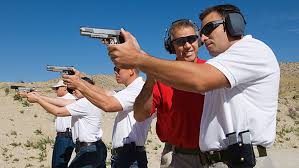
Introduction to the Necessity of Firearm Education
In the realm of firearm ownership, responsibility is the cornerstone upon which a culture of safety is built. The decision to possess a firearm is not one to be taken lightly, as it carries an immense burden of accountability. Comprehensive education and training are paramount in cultivating a deep reverence for the power that these tools wield. This article delves into the intricate language of pistol safety, illuminating the path toward a fluency that transcends mere familiarity and instills a profound appreciation for the gravity of firearm handling.
Decoding the Lexicon: Understanding Pistol Terminology
The world of firearms is replete with a specialized vocabulary, and mastering this lexicon is the first step toward achieving true proficiency. Terms such as caliber, action, and trigger may seem innocuous to the uninitiated, but they hold profound significance in the realm of firearm operation and safety. Proper nomenclature serves as a conduit for effective communication, fostering a shared understanding among enthusiasts, instructors, and the broader community. By demystifying these terms, individuals can engage in meaningful discourse, comprehend technical manuals, and ultimately, cultivate a culture of safety that permeates every aspect of firearm interaction.

The Four Universal Rules: A Cornerstone of Pistol Proficiency
At the heart of firearm safety lies a quartet of principles that serve as an unwavering foundation. These four universal rules – treating every firearm as if it is loaded, never pointing the muzzle at anything you are not willing to destroy, keeping your finger off the trigger until you are ready to fire, and being aware of your target and what lies beyond it – are the cornerstone of pistol proficiency. Adherence to these tenets is not a mere suggestion but a non-negotiable imperative, as the consequences of complacency can be catastrophic. Through comprehensive training, these rules become ingrained into muscle memory, transforming from abstract concepts into instinctive behaviors that safeguard against preventable tragedies.
Muscle Memory and Mindset: Developing Correct Handling Habits
Proficiency with firearms extends beyond mere theoretical knowledge; it is a amalgamation of physical skills and psychological conditioning. Repetitive, supervised training is the crucible in which correct handling habits are forged, instilling a deep-rooted muscle memory that transcends conscious thought. The psychology of instinctive responses plays a pivotal role in this process, as the ability to react swiftly and appropriately in high-stress situations can be the difference between life and tragedy. Continuous skill reinforcement is paramount, as complacency breeds vulnerability, and the consequences of lapses in judgement can be severe.
Seeking Credible Instruction: The Hallmark of Responsible Ownership
In the pursuit of firearm fluency, the role of certified instructors and reputable courses cannot be overstated. These guardians of knowledge possess not only the technical expertise but also the pedagogical skills to impart lessons that resonate on a profound level. Programs such as the handgun safety training course on Maui exemplify the commitment to fostering a culture of responsible ownership, providing a safe and structured environment for individuals to hone their skills under the guidance of experienced professionals. Firearms ownership is a lifelong journey, and the pursuit of knowledge should be an ongoing endeavor, as complacency breeds vulnerability in a realm where vigilance is paramount.
Conclusion: Embracing Firearm Fluency as a Civic Duty
The language of firearm safety is not merely a collection of words and phrases; it encodes a profound respect for the immense power that these tools wield. Attaining fluency in this lexicon is a civic duty, one that transcends personal interests and speaks to a broader responsibility to society. By prioritizing education, seeking credible instruction, and cultivating a mindset of preparedness, individuals can elevate themselves beyond mere ownership and become true stewards of firearm safety. In doing so, they not only safeguard themselves and their loved ones but also contribute to a culture that upholds the sanctity of life and fosters a deeper appreciation for the grave responsibility that accompanies the privilege of firearm possession.
Write and Win: Participate in Creative writing Contest and win fabulous prizes.


